#peleus
Text
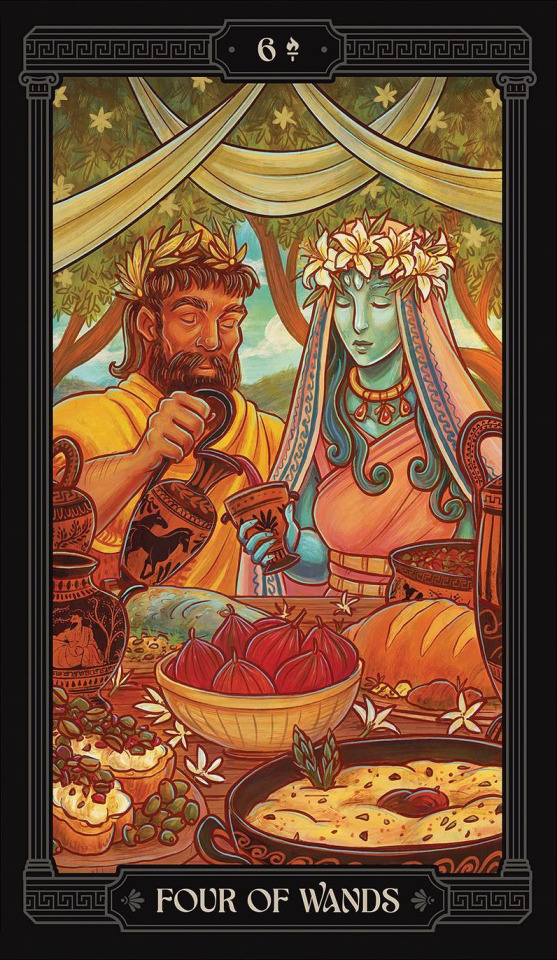
Four of Wands. Art by Ivy K, from the Mythos Tarot.
THE WEDDING OF PELEUS AND THETIS
20 notes
·
View notes
Text
Nobody:
Absolutely nobody:
Me at 1am:
If we take a version of the myth in which Achilles' father, Peleus, is Chiron's grandson
and a version in which Apollo is the father of Chariclo, who is Chiron's wife,
then Apollo is Achilles' great-great-grandfather.

Do whatever you want with this information.
#what if Achilles has blond hair because Apollo is blond#Apollo#Achilles#peleus#chiron#Chariclo#greek panteon#greek myths#greek gods#greek mythology#greek heroes#tagamemnon
597 notes
·
View notes
Text
Jason and the argonauts as requested!
I know Atalanta isn’t a part of the argonauts in most interpretations, but I needed an excuse to draw her…

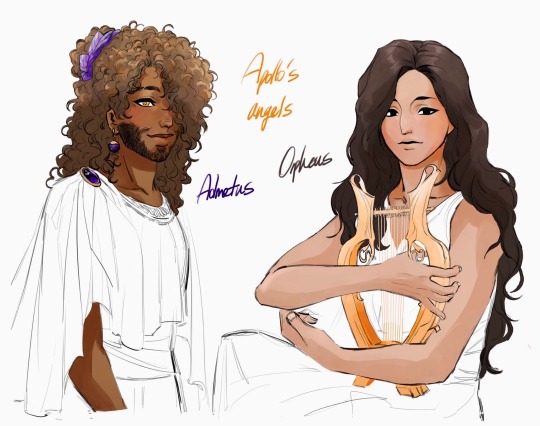





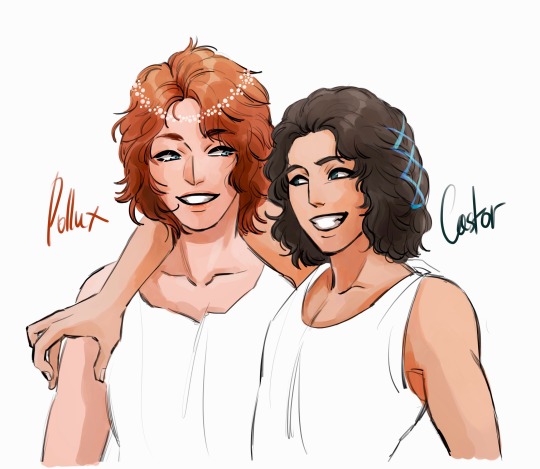
#greek mythology#jason and the argonauts#jason and medea#medea#orpheus#admetus#heracles#peleus#hylas#telamon#menoetius#oileus#zetes#calaïs#pollux#castor#dioscuri#phlias#atalanta#meleager#argonautica#sorry I can’t color clothes :(
276 notes
·
View notes
Text
I think that one of my favorite parts of studying the Iliad and the Trojan war is how incredible the world building is. The fact that you can research any of the characters and find their life prior to and (in some cases) after the Trojan War, their families and typically fathers which themselves form parts of different epics (Telamon, Peleus and Laertes all being Argonauts who sailed with Jason for the golden fleece) (Depending on the version Herakles, Orpheus, Theseus and Atalanta could’ve also been there with them), and just how much content there is about each figure in the war that you wouldn’t know just by reading the Iliad.
Why was Paris chosen by the gods to pick which goddess was the most beautiful? He proved to the gods on a previous ocassion in a bull competition he hosted which Ares won that he was a fair and honest judge (I guess he lost that fairness in judgement by the time the goddesses appeared before him)
How did Achilles become such an almost undefeatable warrior? He was the son of an Argonaut and a sea-nymph raised by Hera whom both Poseidon and Zeus wanted to bed, and was trained by mighty Chiron who taught heroes like Orpheus and Herakles.
Why are the walls of Troy “impenetrable”? They were built by Apollo and Poseidon disguised as humans due to a punishment from Zeus.
And this is all known with thousands of lines of the Trojan War’s story being lost to time. Imagine if we had more of the Nostoi or Cypria or Little Iliad, if we still had plays like “Myrmidons” or had a better historical understanding of Mycenaean Greece.
And still, with all this content, the Trojan War is just a section of the greater greek myths. The mythologized greek world existed far before Troy, and it continued to push forward far after.
#greek mythology#tagamemnon#trojan war#jason and the argonauts#argonautica#achilles#paris#ares#laertes#telamon#peleus#poseidon#zeus#apollo#ancient greece#homer
145 notes
·
View notes
Text
Achilles: Daddy, can you pass me a spoon?
Patroclus and Peleus both grab a spoon and look at each other
Achilles: I should have specified which one I meant!
#greek mythology#incorrect greek mythology#incorrect quotes#patrochilles#achilles x patroclus#achilles#patroclus#peleus
96 notes
·
View notes
Text
Peleus: *about a wild animal Pat and Achilles brought inside* Get that hideous thing out of here.
Patroclus: Achilles, Peleus wants you out of the palace.
#incorrect quotes#all jokes here#incorrect iliad#achilles#incorrect tsoa quotes#patroclus#patrochilles#achilles x patroclus#incorrect patrochilles quotes#incorrect greek mythology#peleus#when you want to flirt but don’t know how so this comes out of your mouth instead
311 notes
·
View notes
Text

The argonauts are fightingggg and they haven't even set off yet!
"So he spoke, but Idas son of Aphareus burst into laughter and with scorn in his eyes he replied abusively:
'Come now! Tell me this through your prophetic skill: will the gods destroy me in the way your father bestowed the destruction upon the Aloiadai? Take thought for how you will escape my hands if you are found to have uttered empty prophecies!'
So he attacked him angrily and the quarrel would have gone further had not the son of Aison himself restrained their dispute with words of rebuke. Moreover Orpheus took up his lyre in his left hand and began to sing.
- Jason and the Golden Fleece, Book 1 lines 486-494, Apollonius of Rhodes as Translated by Richard Hunter.
Idas really said chat shit get hit. Atalanta is not present in this translation but I simply want her there.
#jason and the argonauts#tagamemnon#greek mythology#classics#ancient greek mythology#greek heroes#jason and the golden fleece#jason son of aeson#peleus#the argonautica#the argonauts#Atalanta#Orpheus#hercules#herakles#idas#idmon#idmon son of Apollo#apollo#argonauts#so many prophets on the argo#and they still forget hercules
47 notes
·
View notes
Text
in a show of contempt towards the myrmidon troops , the honorable and beloved hector prince of troy has stripped patroclus’ corpse of my father’s armor , in a move that is sure to piss me off
262 notes
·
View notes
Text
Chiron: What else is there? She says, "Is beauty all that matters?" And you say, "What else is there?"
Peleus: It was dumb. I know.
Chiron: You should write a book. "How to Offend Women in Five Syllables or Less".
57 notes
·
View notes
Text
Greek Mythology incorrect quotes
Achilles: Bro, I had a dream we fucked.
Patroclus: Bro, relax it was just a dream.
Achilles: Huh, gay, I wouldn’t fuck you.
Patroclus: You wouldn’t?
Achilles: I mean, unless you want to-
Patroclus: As top in this relationship, I think we should-
Achilles: I can't believe you're pulling rank on me.
Hades: I was going to suggest we do Marilyn Monroe and JFK roleplay, but I’d get way too into it.
Persephone: What- how?
Hades: You’d be like “come to bed … Mr. President” and I’d be like, “I need to increase the amount of American military advisors in South Vietnam by a factor of 18.”
Achilles: This bloodline ends with me.
Peleus: That's the fanciest way I've ever heard someone say "I'm gay".
Apollo, trying his first ever cup of coffee: I am ENERGY!
Artemis, an avid coffee drinker, on her twelfth cup of the day: Someone slap me awake or I am literally going to fall into a coma in ten seconds.
Dionysus: I’m having salad for dinner!
Apollo:
Dionysus: Well, fruit salad.
Dionysus: Actually, it’s mostly grapes.
Apollo:
Dionysus: Okay, it’s all grapes.
Dionysus: Fermented grapes.
Apollo:
Dionysus:
Apollo:
Dionysus: It’s wine.
Dionysus: I’m having wine for dinner.
Athena: Ha! Don't you know the trappers trap can trap the trapper?
Athena: I must be losing it, I'm quoting Ares.
Zeus: Do you guys hear something?
Hades: I hear the sound of you shutting the fuck up.
#Greek mythology#patrocolus#Achilles#patrochilles#hades#persephone#persephades#Peleus#Apollo#Dionysus#Athena#Ares#Zeus#apollo#artemis#Incorrect quotes#The Illiad
124 notes
·
View notes
Text
„As Slatkin has observed, there are several echoes in the Iliad of the power that Thetis once wielded in an earlier epoch, and there is one famous passage in which she declares her unhappiness at her present state: Hephaestus, is there now any goddess, of all those that are in Olympus, who has endured so many grievous woes in her heart as are the sorrows that Zeus, son of Cronos, has given to me beyond all others? Of all the daughters of the sea he subjected me alone to a mortal, to Peleus, son of Aeacus, and I endured the bed of a mortal, though greatly against my will (Hom. Il. 18.429–434). This stands in contrast to a passage earlier in this book (18.57–60) in which Thetis implies a happier domestic ambience for the young Achilles than this bitter outburst suggests. We see glimpses of a past in which Thetis appears to have helped to raise Achilles in Phthia and in this same passage she grieves that she will never welcome him back there. But these elements stand in tension with the obvious signs in the epic that she no longer resides with Peleus on a habitual basis.
Homer’s lack of clarity on the current state of relations between Thetis and Peleus is part of a more general vagueness about her marriage and the question of why the goddess married a mortal. The situation is not clarified by the single reference to the wedding of Peleus and Thetis in the Iliad, which comes in the final book, shortly after the epic’s only, and equally elliptical, reference to the judgement of Paris, which was, of course, the event that linked the wedding directly to the Trojan War. Hera complains to Apollo that Hector should not be treated with the same honour as Achilles: Hector is a mortal and was suckled at a woman’s breast, but Achilles is the child of a goddess whom I myself brought up and reared, and gave as wife to the hero Peleus, who was dear to the hearts of the immortals. And all of you gods came to the wedding, and among them you too attended the feast, holding your lyre, you friend of the wicked and perennial traitor. (Hom. Il. 24.58–63)
In this self-serving speech, Hera insists that it was she rather than Zeus who gave Thetis to Peleus, which flatly contradicts Thetis’ own account above. Hera naturally gives no indication that the match between the couple was anything but happy, for that would spoil her point. Homer seems, however, to hint that Hera is actively suppressing her knowledge of the negative outcomes of the match. To be a proper antithesis for Hector, who suckled at a mortal woman’s breast, Hera ought next to specify that Achilles suckled at the breast of a goddess. But Hera does not say that, which is telling. It seems that she has suddenly remembered the tradition that Achilles never nursed at his mother’s breast at all. Hera quickly attempts to remedy the emerging flaw in her rhetoric by asserting that she herself nourished and raised not Achilles but Thetis. Whether or not this claim is true, the failure of the parallelism with Hector and Hecuba betrays her effort to cover up a botched rhetorical gambit. Hera produces her assertion that she reared Thetis precisely because she cannot claim that Thetis suckled and reared Achilles. Even in this context, where Hera, as the goddess of marriage, presents an entirely positive, optimistic view of the union of Peleus and Thetis, traces of its unhappy consequences bleed through to the surface willynilly.”
- Peter Heslin, Secrets and Lies: The Power of Thetis in Roman Culture, in The Staying Power of Thetis: Allusion, Interaction, and Reception from Homer to the 21st Century
22 notes
·
View notes
Text
Thetis
I wanted to draw Thetis because I just adore her, so here we are.
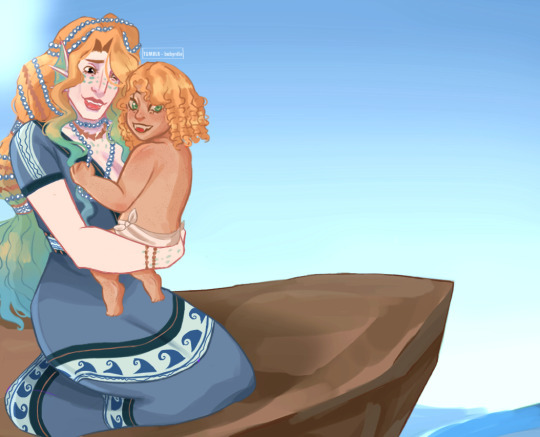
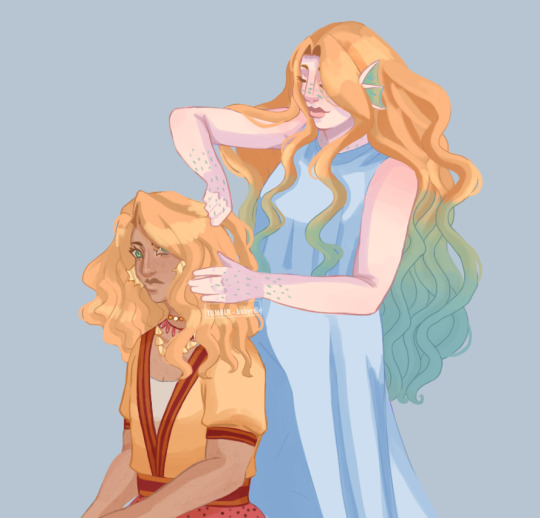
Now I'm going to start chatting since this whole thing involving Thetis and Achilles is of great interest to me, so I'll separate this post into topics.
DIFFERENT COSTUMES
I generally design clothes based more on representations in amphorae or descriptions in Greek plays/poems from myths, which means that the clothes are not Mycenaean. However, I decided to try to make Mycenaean clothing (as it would be most accurate with the time of the Trojan War) at least on mortals. The gods will not necessarily follow costumes according to the timeline. For example, Athena will still have peplos and armor if I draw her.
In my drawings I intend to make Thetis in detailed Mycenaean costumes when living in Phthia, and peplos without adornments when not. I decided to make nymphs with a more "free" look of adornments or tied hair because I think it suits them, and this extends to the naiads and, therefore, Thetis. I intended to make this costume change due to the context of Thetis' story.
I'm following Argonautica a lot because I liked the portrait that Apollonius gave to Thetis. In Book IV, Apollonius shows us about Peleus interrupting Thetis as she tries to immortalize Achilles with fire. Because he interrupts her, the procedure doesn't work and she becomes frustrated and leaves [1], never to return. Achilles was a baby then. After this event, apparently she and Peleus find themselves in an even stranger situation judging by the way Hera comments on Thetis letting go of her anger and the cold interaction she has with Peleus despite this (I say "more" because it was already a situation tense from the beginning).
We also know, from the Hera lines, about how Zeus was interested in Thetis and tried to have something, but she didn't want it. And how Zeus was offended by this, declaring that she would never be the wife of an immortal, but still he continued after her. However, Thetis still never wanted anything to do with him [2]. Finally, Zeus is informed by Themis about the famous prophecy of Thetis' son being greater than his father and fears that her becoming pregnant by an immortal will end up giving birth a threat to him, and then forces her into a marriage with a mortal. Hera's part in this is that she steps forward to choose Peleus herself [3] and even holds the bridal torch for Thetis. Hera is an important relationship in Thetis' story.
In other words, Thetis was forced into a horrible situation against her will, which even involved her being a victim of abuse [4], for something she never had fault. Thetis even spent time on the surface with Peleus, apparently trying to come to terms with what reality should be. But the mere fact that she tries to immortalize Achilles shows that, in the end, she was never "ok" about it. And Peleus messing this up (accidentally. He thought Achilles was going to die for obvious reasons: fire) only made her even more frustrated at what her life had become. That was her limit and she returned to sea never to return to live in Phtia. The possibility of making her son immortal like her was what had been keeping her there, day after day discreetly trying to burn away Achilles' mortality. Without that being possible anymore, she left.
In Argonautica, we also know that Achilles is on Mount Pelion, being trained by Chiron and raised by naiads. He must still be a child (instead of a teenager, for example), considering that at the Chiron's wife holds him on her lap and shows him to Peleus before Peleus leaves with the Argonauts in Book I. Hera suggests that Thetis isn't a figure present in this part, so I imagine that Thetis must not have been frequent in Pelion. Still, part of the reason why she helps the Argonauts is precisely Achilles, so I think that even though she was far away [5], she still cared about him.
I think that, while living with Peleus, Thetis was, in a way, already trying to fit into a life that was not hers. The sea was her life. Hence the obvious difference in the way she dresses. While in Phtia, she focuses on dressing like a high-class mortal, as she's married to a mortal king. However, she still wears marine colors, wave patterns, and pearl accessories because I imagine that even though she can no longer be at sea, Thetis still wants to keep part of where she came from with her.
After leaving Phtia, I imagine that she goes back to wearing less detailed peplos and her hair loose like the other nymphs. Because she doesn't feel like she needs to look like a king's wife and prefers the way she was before.
SKYROS
The second drawing is basically the myth in which Thetis, fearing that her son will follow the part of the prophecy that says he will die young, ends up hiding Achilles on the island of Skyros. Thanks to this, Achilles is one of the last to be recruited by the Achaeans to go to Troy. I think that being one of the only moments where it could just be her and her son, I like to imagine that Tethys would be a relatively more frequent presence. Perhaps Thetis was even excited by the idea of having him away from everything and wanted to enjoy it, deep down feeling that the time would one day come. So I like to think that she actively enjoyed arranging his hair into intricate hairstyles and choosing what he would wear. After all, Achilles himself wouldn't know how to do this because he'd never done it before.
She loved Achilles very much. It's evident in every scene of hers in The Iliad. She always listens to him, demands a favor from Zeus to follow his wish, appears with her sisters to console him after the death of Patroclus, and then demands a favor from Hephaestus to make armor for him (Book I, Book VIII, Book XVIII, Book XXIV). In the Odyssey, it's also said that from the sea came a terrifying scream that made the Achaeans, even the bravest, start running in the direction of ships until they noticed that it was Thetis, coming out of the sea after discovering the death of Achilles. After that, she's one of the people responsible for his funeral and is the one who chooses the prizes for his funeral games (Book XXIV)
So yeah, seeing as she's, I think Thetis would enjoy Skyros for as long as she can. Unfortunately for us, there is no Greek play/poem on the subject, at most mentions in other literary works and representations in art. The other sources are Roman, not Greek.[6]
DESIGN
Finishing with the design. Achilles' design has already been explained here and here. The difference is that in those designs he's already in Troy and, therefore older. I'm following one of the versions given by Pseudo-Apollodorus, in which he says that Achilles was fifteen years old at the time of preparations to go to Troy. So I'm giving him fifteen on Skyros too before he's discovered (fourteen at most, but I imagine fifteen). Here he's less tanned because he didn't spend the 10 years in Troy, but he's still tanned because he spent at least part of his life in Pelion. Shorter hair because it hadn't grown as much. He's also shorter in height. My adult Achilles is 1,90 (6'3), and here I imagine he's still tall compared to the other girls on Skyros, but not as tall as he is as an adult.
Regarding Thetis, I imagine her tall because she's not mortal, very pale because it reminds me of the coldness of the depths of the sea, with black eyes since fish usually have black eyes and blonde hair because Achilles' blonde hair reinforces his demigod trait, so I imagine it came from Thetis. The sharp teeth are not fangs, just slightly larger canines, which even humans can have. I imagine her being just over 2 meters tall in her main form, but being able to change her height.
Her having more obvious fish features, like the fin on her ear, isn't accurate with Greek mythology. In Greek mythology, nymphs have the same appearance as others: that is, similar to mortals, just very beautiful. However, I took the liberty of bringing her closer to fish features as I see people doing with various characters in modern interpretations. But I imagine that she when in Phytia's palace, wore a more human appearance. In the first image, she's in the sea, so it isn't a concern.
NOTES (I think...?)
1. Fun fact: a similar scene is in Hymn to Demeter with Demeter (Thetis), Metanira (Peleus), and Triptolemus (Achilles).
Demeter, disguised as an old human woman, receives hospitality from Metanira while searching for her daughter Persephone, who had been forcibly kidnapped by Hades. As a way of rewarding Metanira for her hospitality, Demeter intends to immortalize her son Triptolemus, using ambrosia and fire to do so. Once, Metanira sees her doing this and is scared, thinking that Demeter is trying to kill her son. Metanira's reaction and Peleus's are written in an extremely similar way. Demeter then reveals herself as a goddess and is stressed by Metanira's interruption.
2. One of the reasons cited by Hera, along with her having raised Thetis, which is a detail that is also present in The Iliad, for her to like Thethis. This is mentioned in The Iliad in Book XXIV. Hera raising Thetis is also identified by Pseudo-Apollodorus.
3. In the same book of The Iliad (XXIV), there is a mention of Hera having chosen Peleus.
4. She transformed into different animals to try to escape Peleus, but unfortunately, she couldn't. Examples of them fighting: 1, 2, 3, 4.
5. It's consistent with Euripides' version in Iphigenia in Aulis. Clytemnestra asks Agamemnon if it was Thetis or Peleus who raised Achilles, and he responds that it was Chiron since Peleus gave Achilles to him when he was still young because he didn't want him to learn the customs of wicked mortals.
Apollonius and Euripides give us both Peleus and Thetis as absent parents in Achilles' growth, apparently Chiron being the central figure for Achilles. However, Homer apparently did not. Achilles is still trained by Chiron, just as his father was, and there are signs of the centaur in the narrative (such as the mention of Patroclus knowing how to heal because Achilles, having been taught by Chiron, taught him. And also the ash spear itself having previously been of Chiron. This spear is mentioned that only Achilles of the Achaeans can lift).
But we have Phoenix in Book IX describing how he participated in the education of Achilles, saw him as a son, and he told things in general that happened in Phthia. In turn, Thetis occasionally mentions that she raised Achilles (although, perhaps it's a matter of translation and in the original Greek it's more linked to giving birth? But in the translation I read it's in the sense of being present in the growth). There's the whole thing about Patroclus having grown up in Phtia with him and Peleus knowing him well enough to entrust Achilles to him.
Furthermore, it's said that Peleus sent Achilles to Agamemnon, not that he was found in Skyros (Book IX). But Skyros is still mentioned as the place where Achilles' son Neoptolemus is (Book XIX). So, for Homer, Achilles was still on Skyros and had a son there (I assume Deidameia is the mother since in later versions she is, but Homer doesn't give a name), but he was not discovered in Skyros. I've seen this interpreted as a lie, since the person saying this is Odysseus (along with Diomedes, he's often said to have discovered Achilles in Skyros) and he could be covering up the way Achilles was found, since there were other characters present in this scene. But in the end it's still an interpretation, we can't say for sure.
In addition to Greek mythology, the relationship of Achilles and Chiron is still an important relationship of the character of Achilles present in Roman mythology.
6. The best-known version of the myth is Statius's incomplete epic called Achilleid. But it's a Roman version, so I'll avoid considering it here since I'm only referring to Greek mythology and I prefer not to mix the two too much. Despite this, it's possible to know that it's a myth of Greek origin from a few Greek sources on the subject that have come down to us.
26 notes
·
View notes
Text
I’m sorry, but Achilles blatantly flirting with a baffled Patroclus, while his father told a story, will never not be funny to me.😂😂
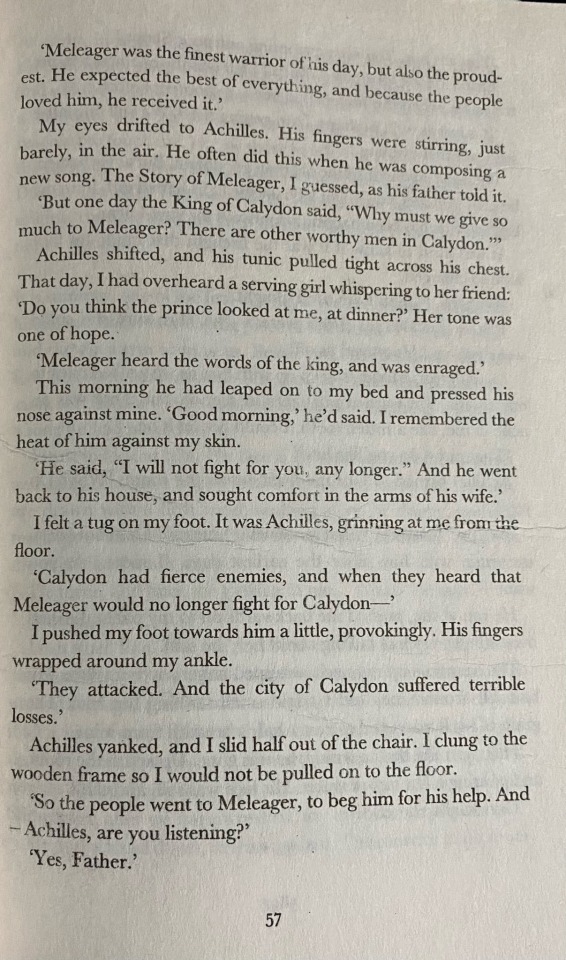
#i’m suffering from post tsoa trauma#tsoa#the song of achilles#achilles x patroclus#patrochilles#peleus#tsoa achilles#bookblr#greek tumblr#madeline miller#gay love#gay panic#lgbtq characters#lgbt pride
485 notes
·
View notes
Text
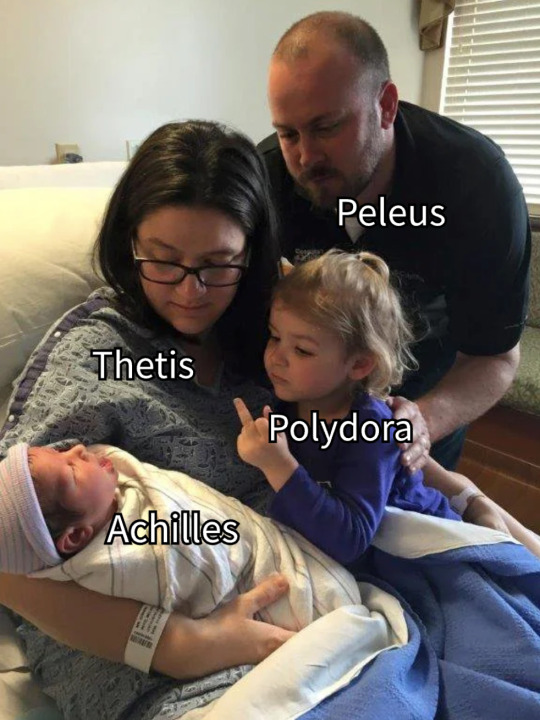
#achilles#peleus#thetis#polydora#incorrect greek mythology#greek myth memes#sibling shenanigans#refuse to elaborate further
73 notes
·
View notes
Text
Achilles: *to Peleus* I want a boyfriend so I can bite him.
Peleus: *wondering where he went wrong* Cool.
#incorrect quotes#all jokes here#incorrect iliad#achilles#incorrect tsoa quotes#patroclus#patrochilles#incorrect greek mythology#peleus
292 notes
·
View notes
Text
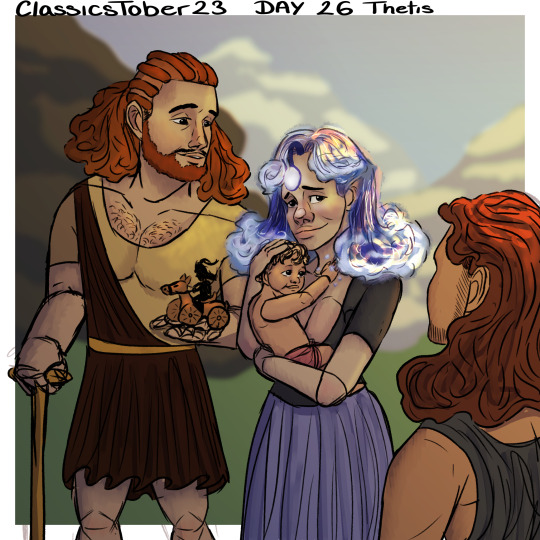
Hephaestus making his adopted mom baby toys for tiny baby Achillies
#tagamemnon#greek mythology#classics#greek heroes#ancient greek mythology#trojan war#achillies#thetis#peleus#thetis x peleus#hephaestus#pantheon#baby Achillies#ClassicsTober#ClassicsTober23
53 notes
·
View notes